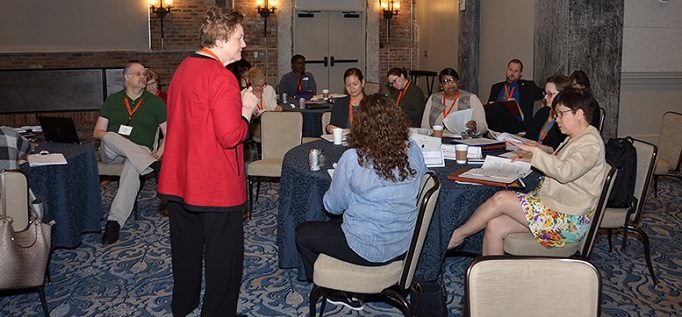Stronger bonds and new services
By Madeline Patton
March 6, 2019
Through Mentor-Connect, college faculty and staff gain grant-preparation skills to prepare proposals and obtain National Science Foundation grants in the future.
Over three intense days during Mentor-Connect’s 2019 Technical Assistance and Grant Writing Workshop, faculty, administrators and grant writers on teams from 22 community colleges began as strangers — sometimes people from the same campus who barely knew each other prior — and emerged as colleagues who cheered for each others’ elevator speeches and divided the tasks to complete proposals for the Advanced Technological Education (ATE) program in advance of the October 3 deadline.
This seventh cohort of Mentor-Connect mentees had their first in-person conversations with their mentors at the workshop convened this month in New Orleans. During plenary sessions, Mentor-Connect leaders and special guests offered tips about the technical aspects of submitting ATE proposals and addressing other expectations of the National Science Foundation (NSF), which funds ATE program.
Elaine Craft, principal investigator of Mentor-Connect, said the grant-preparation skills that Mentor-Connect teaches and the capacity-building it offers to community and technical colleges help mentees prepare their proposals and obtain other NSF grants in the future.
“We are starting you on a journey that we hope is a long and fruitful relationship,” Craft said.
Mentor-Connect, an initiative of the South Carolina Advanced Technological Education Center of Excellence (SCATE) at Florence-Darlington Technical College, works in partnership with the American Association of Community Colleges (AACC).
New mentoring services
With support from its newest ATE grant, Mentor-Connect is adding two more no-cost services to help more colleges embark on these relationships. It now offers Second-Chance Mentoring for faculty whose ATE proposals have been declined, and Moving-Up Mentoring to anyone who received funding through the Small Grants for Institutions New to ATE Program obtain a second larger ATE project grant.
Applications for Second-Chance Mentoring may be submitted via email to mentor-connect@fdtc.edu at any time within two years from the date the proposal was declined. The Moving-Up Mentoring application will soon be posted on Mentor-Connect’s website.
“These efforts help to ensure that new-to-ATE colleges persist in submitting grant proposals and that newly funded colleges continue to expand their work preparing STEM technicians for the workforce,” said Ellen Hause, co-principal investigator of Mentor-Connect and AACC program director for academic and student affairs.
Encouraging faculty leadership
During her workshop presentations, Craft emphasized that faculty must drive the technician education improvement projects that are the focus of ATE. Mentor-Connect also cultivates the leadership skills of its faculty mentees by offering mentoring, providing professional development and facilitating engagement with others in the ATE community.
Craft pointed out that when faculty members become principal investigators of ATE projects “it opens up possibilities, creates new partnerships, (and) just broadens your thinking and experiences in ways that you couldn’t have imagined.”
She emphasized that ATE grants provide a “unique opportunity” for two-year college faculty to obtain funds for release time, professional development and equipment to test their ideas for improving the education of technicians in advanced technology fields.
During the next eight months, the Mentor-Connect mentee teams are expected to prepare ATE grant proposals with their mentors’ guidance mostly through phone calls and emails. But the conversations between the mentors and mentees at the recent workshop served as foundations for the teams’ upcoming work.
There’s more to the story! Read the full article in CC Daily.



